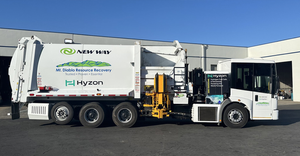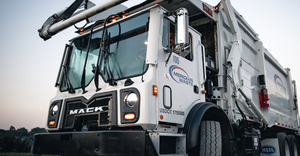Dominion Energy Sets Goal of Net Zero Emissions by 2050
The goal covers dominant greenhouse gases from Dominion’s electricity generation and gas infrastructure operations.

Dominion Energy announced a significant expansion of the company's greenhouse gas emissions reduction goals, establishing a new commitment to achieve net zero emissions by 2050. The goal covers carbon dioxide and methane emissions, the dominant greenhouse gases, from Dominion’s electricity generation and gas infrastructure operations.
The commitment builds on the company's history of environmental stewardship, while acknowledging the need to further reduce emissions consistent with the findings of the United Nations' Intergovernmental Panel on Climate Change. It is also a recognition of the increased expectations and interest, among customers as well as employees, in building a clean energy future.
"Our mandate is to provide reliable and affordable energy—safely,” said Thomas F. Farrell II, Dominion Energy chairman, president and CEO, in a statement. “We do that every day, all year long. But we recognize that we must also continue to be a leader in combating climate change. Our employees have always been problem solvers in the work we do for our customers. I am confident we can use this same mindset to help solve this challenge and leave the world a better place for future generations.”
"Dominion Energy already has made important progress on emissions. This new commitment sets an even higher bar that I am confident we can—and will—reach,” he added. “Net zero emissions will be good for all of our stakeholders—for our customers, communities, employees and investors.”
Dominion had previously committed to cut methane emissions from its natural gas operations by 50 percent between 2010 and 2030 and carbon emissions from its power-generating facilities by 80 percent between 2005 and 2050. Progress toward those goals has been significant, as Dominion has cut carbon emissions approximately 50 percent since 2005 and reduced methane emissions by nearly 25 percent since 2010.
Under the strengthened emissions framework, the company will focus not only on driving toward the 2050 goal but on achieving near-term progress, particularly on methane, which is a more potent greenhouse gas than carbon. Under the net zero framework, the company is committing to decrease methane emissions by 65 percent by 2030 and 80 percent by 2040, from 2010 levels. Furthermore, the company has committed to invest in renewable natural gas (RNG) projects that will capture an amount of methane from U.S. farms at least equivalent to any remaining methane and carbon dioxide emissions from the company's natural gas operations, making Dominion's gas infrastructure area net zero 10 years before the overall company.
The company is moving to extend licenses for its zero-carbon nuclear generation fleet, promoting customer energy efficiency programs, and investing in wind and solar power, lower-carbon natural gas and carbon-beneficial RNG. Over the long term, achieving this goal also will require supportive legislative and regulatory policies, technological advancements and broader investments across the economy. This includes support for the testing and deployment of technologies such as large-scale energy storage, hydrogen, advanced nuclear and carbon capture, all of which have the potential to significantly reduce greenhouse gas emissions.
"As Dominion Energy makes the necessary investments to reach net zero emissions, we will take steps to ensure our most vulnerable customers—those struggling to make ends meet—continue to have the support they need to maintain service and keep their bills manageable," noted Farrell.
In addition to reducing its emissions, Dominion Energy said it expects to go "beyond" its own efforts to help accelerate greenhouse gas reductions in other industries. The company said it is well positioned to unlock progress in transportation, agriculture and manufacturing.
Transportation: Dominion Energy is poised to support a reduction in the carbon footprint of the transportation sector:
By enhancing the resiliency and flexibility of Dominion's electric grid to enable more rapid deployment of electric vehicle charging infrastructure, as provided in Virginia by the Grid Transformation and Security Act.
By developing the largest electric school bus program in the nation, with plans to accelerate that effort in the coming years.
By using liquefied natural gas, compressed natural gas and hydrogen fuels in place of higher-carbon fuels in larger vehicles such as long-haul trucks and maritime shipping vessels. Allowing these fleets to access RNG will drive down their carbon footprint even further.
Industrial: Significant progress can be made by converting oil and coal-powered manufacturing facilities to lower-carbon natural gas. These emissions reductions would be analogous to the progress already achieved in electricity generation by transitioning from coal to cleaner natural gas.
Agriculture: The ability to capture methane from farm operations represents a major opportunity to help reduce greenhouse gas emissions in this sector. Dominion Energy is partnering with the nation's largest hog and dairy producers and has committed to $700 million of shared investment to capture methane emissions from the farms and use RNG to serve homes, businesses and vehicle fleets.
About the Author
You May Also Like


